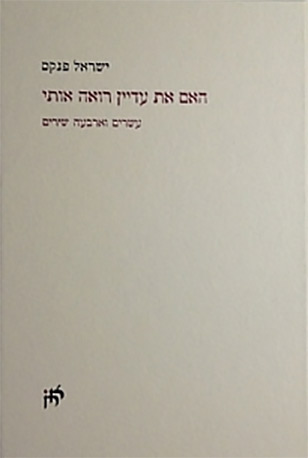
Do You Still See Me? Twenty Four New Poems
“One of the most beautiful collections of poetry that I have ever read,” is what author Dror Burstein wrote when Israel Pincas’s volume of collected poems appeared in 1999. Many others have also praised the poems, equally enthusiastically. A poet beloved by poetry lovers, he burst onto the scene in full force from his very first works. His refined and restrained poems refer to the cultural and artistic traditions of the countries along the shores of the Mediterranean Sea – Greece, Italy and France – and are in constant dialogue with their glorious and epic histories, as expressed in Greek and Roman mythology, in the Renaissance civilization, and in the masterpieces of the 19th century. That said, his modernist poetry relates to the revolution Israeli poetry underwent in the 1950s and 60s. Pincas may have turned his back on topical matters and never wrote political poetry, but he did express personal, family and collective memory. His poems depict is childhood in Tel Aviv in the 1940s and 50s, the feelings of the persecuted refugees who migrated to the Land of Israel, and the sorrow over the fallen of Israel’s wars. But even as he addressed the distress of the individual and the collective, he remained an existentialist poet reflecting upon the human condition.
Antennae and Sensors and Do You Still See Me? are Pincas’s most recent books.
Do You Still See Me? is dedicated to the poet’s wife and it is an inner journey to his biography, a summation of his life. In this book the poet encounters events of his past, family figures, and works these fragments of memory and longing into sublime, moving verse.


- Languages
-
French
-
French
Paris, Obsidiane, 2019
-
| Title | Do You Still See Me? Twenty Four New Poems |
|---|---|
| Writer's Last Name | (Anton) Pincas |
| Writer's First Name | Israel |
| Genre | Poetry |
| Publisher (Hebrew) | Even Hoshen |
| No. Pages | 39pp. |
| Book title - Hebrew (phonetic) | Ha-Im At Adayin Ro'a Oti: Esrim Ve-Arba'a Shirim |
-
“Pincas takes an inner journey with characters and with time … It is a restrained and meticulous journey, free of pathos. The words are brought down to eye-level, and go from prose to poetry … The strength of the poems lies in designed and precise depiction, subtle lyrical verse in which the eye of the onlooker is turned inward, toward the library of the images of his memory, and it is from there that he draws the words … A rare and temperate combination of longing without nostalgia … A fine, sharp and accurate précis, like light and rapid brush strikes … Pincas finds his way, distilled and absent any superfluity, to describe historical and personal happenings. ”
-
“Israel Pincas is one of the main poets of the “State Generation” and of Israeli verse in general …Pincas’s linguistic imagination has always bestowed a rare beauty upon his poetry.”
-
“Pincas’s main direction in these poems is the rejection of the musical and the metaphorical. What remains is the tone, the human voice, something it’s hard to put your finger on, but it is poetry without trimmings …The poet is stripped of all of his ruses: of vocal prettification, of imagistic punches … Only the transparent language is likely to do any justice to the robbery that time perpetrates against us. Herein lies the secret of this book’s power. ”
-
“A superb poet whose last collection of verse, Do You Still See Me? I have only got around to reading now. This is not a big book, a little that contains a great deal, a kind of summation of a life, shrewd, meticulous. ”
